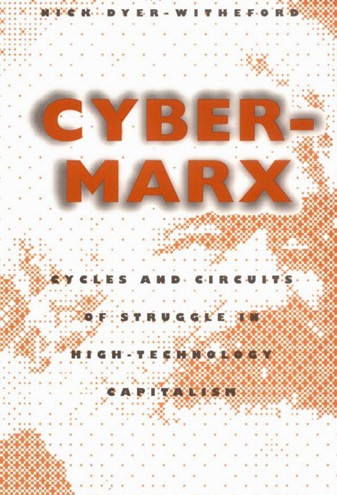
In this highly readable and thought-provoking work, Nick Dyer-Witheford assesses the relevance of Marxism in our time and demonstrates how the information age, far from transcending the historic conflict between capital and its laboring subjects, constitutes the latest battleground in their encounter.
Dyer-Witheford maps the dynamics of modern capitalism, showing how capital depends for its operations not just on exploitation in the immediate workplace, but on the continuous integration of a whole series of social sites and activities, from public health and maternity to natural resource allocation and the geographical reorganization of labor power. He also shows how these sites and activities may become focal points of subversion and insurgency, as new means of communication vital for the smooth flow of capital also permit otherwise isolated and dispersed points of resistance to connect and combine with one another.
Cutting through the smokescreen of high-tech propaganda, Dyer-Witheford predicts the advent of a reinvented, «autonomist» Marxism that will rediscover the possibility of a collective, communist transformation of society. Refuting the utopian promises of the information revolution, he discloses the real potentialities for a new social order in the form of a twenty-first-century communism based on the common sharing of wealth.
Hvorfor peker de økonomiske pilene nedover i Norge? I 2013 hadde vi den beste kombinasjonen av velstand, helse og lykke i verden. Så ble vekst . . .
Scandinavian countries have been praised for their high levels of welfare provision and their economic and social outcomes. It is true that they are successful . . .
From world-renowned economist Paul Collier, a candid diagnosis of the failures of capitalism and a pragmatic and realistic vision for how we can repair it. . . .
Dette er en veldig oppklarende bok og det er ikke vanskelig å se for seg at andre som snakker fornuftig om økonomi, geografi, historie og . . .
Thing 1: There is no such thing as free market.Thing 4: The washing machine has changed the world more than the Internet.Thing 5: Assume the . . .
Brilliant and engagingly written, Why Nations Fail answers the question that has stumped the experts for centuries: Why are some nations rich and others poor, . . .
“If [ The End of Alchemy ] gets the attention it deserves, it might just save the world.” ―Michael Lewis, Bloomberg View Something is wrong . . .
We are well aware of the rise of the 1% as the rapid growth of economic inequality has put the majority of the world’s wealth . . .
Thomas Pikettys bog «Kapitalen i det 21. århundrede» handler om økonomi, kapitalisme, ulighed, meritokrati og demokrati. Med «Kapitalen i det 21. århundrede» har Thomas Piketty . . .